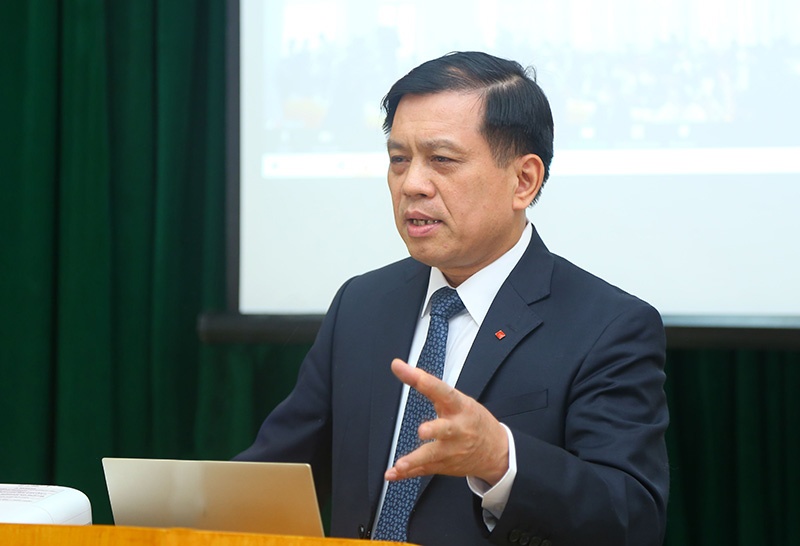Vietnamese labourers strive to best avail of labour market reopening
 |
| Deputy Minister of Labour, War Invalids and Social Affairs Nguyen Ba Hoan |
How has Vietnam prepared to welcome the reopening of foreign labour markets?
As the coverage of vaccines against COVID-19 in Vietnam and many countries has increased sharply, some countries have gradually reopened their labour market to receive foreign workers, including Vietnamese ones.
For instance, South Korea has reopened since last May after more than a year. Taiwan reopened on February 15 while Japan began in March after more than a year of border closures. Some other markets also have policies to accept workers with appropriate conditions and regulations again.
| Vietnamese workers are often appreciated by employers and relevant agencies in receiving countries for their hard work, diligence, work quality, and efficiency. |
To prepare for local workers to go abroad, the Ministry of Labour, War Invalids and Social Affairs (MoLISA) worked closely with relevant agencies in receiving countries and territories to be able to present appropriate instructions and guidance.
In addition, the MoLISA has been working with relevant domestic agencies, localities and overseas Vietnamese representatives abroad to remove difficulties and obstacles in preparing labour sources and procedures paving the way for local workers going abroad, such as the procedures on vaccinations, vaccine passports, health insurance, among others.
How many trained labourers are ready to go abroad?
According to reports of enterprises, the number of employees who have been recruited and are waiting to leave the country is now more than 80,000 people (of which about 60,000 people are bound to work in Japan, about 13,000 in Taiwan, and about 7,000 in South Korea).
To get hold of labour resources, in the past months, the MoLISA has directed localities, businesses, employment service units, and vocational training institutions to support and create conditions for employees to return to work abroad.
Along with that, efforts geared towards promoting links between receiving and sending enterprises, as well as other stakeholders, have been made.
In 2022, what occupations are the most interesting for Vietnamese labourers abroad?
The majority of Vietnamese labourers abroad focus on the processing and manufacturing sector, accounting for more than 80 per cent every year. Other potential fields are healthcare – such as in nursing, hospital aid, and senior residences – agriculture, and construction.
Vietnamese workers are often appreciated by employers and relevant agencies in receiving countries for their hard work, diligence, work quality, and efficiency. Several markets such as Japan, Taiwan and South Korea prefer to receive Vietnamese workers over many other countries.
In 2021, labour export only reached 50 per cent of the set plan. This year, the MoLISA aims to send 90,000 workers abroad, double last year’s level. What plans does the Ministry have in place to reach the goal?
In 2022, Vietnam and many other countries have revised policies for pandemic adaption in the new normal. The demand for labour is expected to go up steadily, providing favourable opportunities for sending more labourers to work in these markets.
Along with traditional markets, MoLISA continues signing labour agreements with Germany, Australia, Israel, and several other countries in Europe. Thus, the target of sending 90,000 workers abroad in 2022 is within reach.
What the stars mean:
★ Poor ★ ★ Promising ★★★ Good ★★★★ Very good ★★★★★ Exceptional
Related Contents
Latest News
More News
- Digital economy takes centre stage in Vietnam’s new growth model (January 28, 2026 | 11:43)
- EU Council president to visit Vietnam amid partnership upgrade (January 28, 2026 | 11:00)
- Vietnam entering a new growth phase in 2026 (January 28, 2026 | 10:02)
- VIMC targets higher profit and throughput in 2026 (January 26, 2026 | 19:00)
- GEVA a launchpad for Vietnam’s agricultural exports (January 26, 2026 | 12:03)
- Data-driven risk management signals major shift in customs administration (January 24, 2026 | 11:22)
- Cosmetics rules set for overhaul under draft decree (January 24, 2026 | 11:21)
- Vietnam Airlines seeks aircraft through dry lease (January 22, 2026 | 20:43)
- Policy obstacles being addressed in drug licensing and renewal (January 22, 2026 | 20:17)
- Vietnam’s wood exports surpass $17 billion (January 22, 2026 | 20:15)

 Tag:
Tag:



























 Mobile Version
Mobile Version